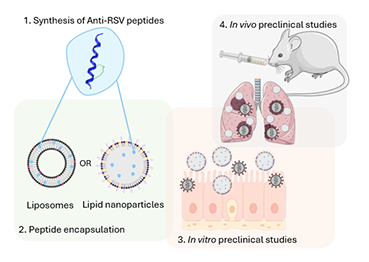

Respiratory syncytial virus (RSV) is one of the leading causes of respiratory infections worldwide. Each year, it is responsible for 33 million infections and nearly one-third of pneumonia cases. Young children with heart, lung, or neuromuscular diseases are particularly vulnerable. In 2017, the cost of RSV infections was estimated at 4.82 billion euros, highlighting its enormous health and economic impact.
Currently, no effective treatment exists against RSV. Antiviral peptides, small molecules composed of few amino acids, have been developed to block the virus from spreading, but their low solubility and limited ability to cross the mucus barrier reduce their effectiveness.
Supported by the Swiss National Science Foundation (SNSF), this project is a collaborative project between HES-SO, CMU Unige, INRAE & University of Tours and aims to address this challenge by:
This interdisciplinary project brings together peptide chemistry, nanotechnology, and animal studies. The ultimate goal is to develop a safe, innovative, and effective formulation with strong potential for treating RSV infections.
Project partner(s)
Project leader - team
Irena Milosevic
(HEPIA),
Zuzana Kadlecová
(HEPIA),
Vincent Pautu
(HEPIA)
